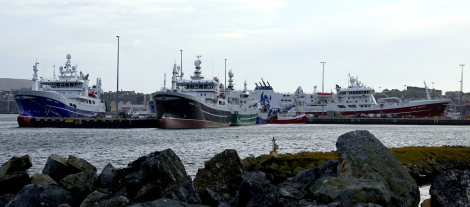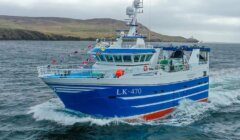Marine / Pelagic industry at loggerheads with government over new landing rules
SCOTLAND’S pelagic fishing industry is taking the government to court over recent rule changes that make it compulsory for vessels to land more of their catch in Scotland.
The industry, consisting of 20 large pelagic trawlers including eight based in Shetland, said it stands to lose millions of pounds in revenue should it be legally required to land 55 per cent of mackerel and herring at Scottish ports.
The requirement to demonstrate what is known as “a real economic link” of vessels to the country they are registered and licensed in is nothing new.
In the past, fishing companies could comply with the rules by either landing 50 per cent of its quota into UK ports or employing crew of which 50 per cent lived in the UK, or by spending half of its operating cost in the UK.
However last year, following two rounds of consultation, the Scottish Government tightened these rules, did away with the crewing element, and ordered vessel owners to land at least 55 per cent of shellfish and demersal species into UK ports as of 1 January 2023.
The pelagic industry, which largely lands at Norwegian ports, was given some reprieve in that the new rules were phased in; 30 per cent in 2023, 40 per cent in 2024 and 55 per cent by 2025.
Chief executive of the Shetland Fish Producers’ Organisation (SFPO) Brian Isbister said that, principally, the pelagic sector was not opposed to the concept of landing more Scottish owned and caught quota in Scotland.
However, he added that the sector felt it had to pursue the legal route out of “sheer frustration in terms of the lack of understanding and support from the Scottish Government”.
Become a member of Shetland News
“It’s purely and simply about the reality of the market we operate in and the impact that would have on our fishermen in the transition towards that,” Isbister said.
“We offered to the government alternative approaches, which so far they have failed to take on board.”
Isbister added that he was unable to say much more while the legal dispute was ongoing.
Meanwhile, a joint attempt by the Scottish Fishermen’s Organisation (SFO) and the SFPO to halt the introduction of the new rules pending the outcome of a judicial review failed.
In a judgement made on 23 December, Lord Ericht at the Court of Session refused to grant an interim interdict after the Scottish Government gave assurances that the industry would be able to claim damages should the change in the rules be found unlawful by the court at a later date.
In his legal opinion Lord Ericht noted that it was one of the SNP’s 2016 election pledges to set new landing targets “for all Scottish fishing boats to ensure more fish are landed in Scotland to create jobs and support local businesses and our fishing communities”.
The judge further noted that landing requirements in England had been increased from 50 to 70 per cent from 1 April 2022.
However, the pelagic fishing sector claims it would suffer substantial financial loss as pelagic fish landed and processed in Norway are a premium product and attract higher prices.
For some vessels the entire catch may be landed in Norway for the benefit of a higher price than Scotland, the industry said.
Giving an example, they said that the 55 per cent landing requirement would amount to an annual reduction in revenue of £1.5 million for one particular vessel.
The price gap is said to be £200 per tonne for mackerel and £70 for herring, a claim disputed by the Scottish Government whose legal team made the counter claim that the average mackerel price in Scotland and Norway is substantially the same, although prices vary across the season.
The court noted that at 40 per cent operating profits were at the high side, while the government submitted that Norway was benefitting from Scottish fishing quota, and that Scottish fish processors had spare capacity.
They also observed that, given the “super-normal profits” the new landing condition would be a small proportion of the annual revenue of the pelagic vessels but would provide a significant increase to the Scottish economy.
It is expected that the judicial review will be heard at the Court at the Session in the autumn of this year.
Become a member of Shetland News
Shetland News is asking its many readers to consider paying for membership to get additional features and services: -
- Remove non-local ads;
- Bookmark posts to read later;
- Exclusive curated weekly newsletter;
- Hide membership messages;
- Comments open for discussion.
If you appreciate what we do and feel strongly about impartial local journalism, then please become a member of Shetland News by either making a single payment, or setting up a monthly, quarterly or yearly subscription.


































































